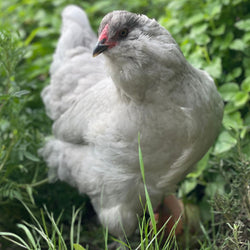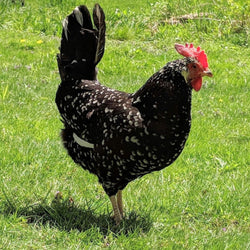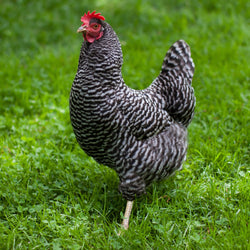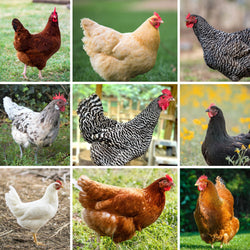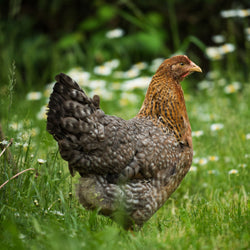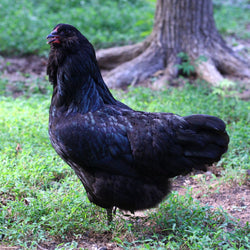f=menu&page=20/--
Frequently Asked Questions
Here we answer the most commonly-asked questions about ordering, chicken care, and more.
I got a terrible hatch. Does that mean most of my eggs were infertile?
No, a terrible hatch doesn't mean that most or even any of your eggs were infertile! They may all have been fertile. Remember, just because an egg doesn't hatch (or even if it doesn't develop), that doesn't mean it wasn't fertile. It is not possible to see the fertilized blastodisc, or blastoderm, on the yolk of the egg after 21 days of incubation, as it will have deteriorated by then. �If you have a rooster with your hens, you can presume good fertility up to about a ratio of ten or twelve hens to every rooster. To check your exact...
Read MoreHow large are chickens?
Chickens can vary in size greatly by breed and variety! Large fowl cochin beside bantam cochin Large fowl chickens can range from 4 pounds for small hens to nearly 15 pounds for the largest roosters! Bantams vary in size, too. They can weigh from a few ounces for the tiniest seramas to more than two pounds for larger bantams. Generally speaking, bantam versions of large fowl breeds tend to be 1/3 to 1/2 the size of the larger birds.
Read MoreCan I choose what breeds I get when I purchase an assortment?
No, we're sorry. If you want specific breeds or colors, you'll need to purchase each breed you want and construct your order that way. The assortments are hatchery choice, and are not sorted by breed or color.
Read MoreWhat can I do to reduce the risk of my birds getting sick with Salmonella or another illness?
The easiest thing to do is simply to provide your birds with safe, roomy, clean conditions. Research has shown that a diet of whole grains and seeds is associated with decreased Salmonella colonies -- so start there! We offer these treats that fit the bill: Farmer's Helper Optimal ForageCake Supplement Sunflower Sensation Organic Chicken Crack Sounds easy. Too easy, right? Especially since, if you're even reading this, you're probably already a responsible chicken owner concerned with providing your flock the best care you can... so you've undoubtedly provided lots of space and clean conditions to begin with. But consider this:...
Read MoreHow many roosters can I have?
We normally recommend one rooster for every ten hens or so. In a large flock, there is often more than one rooster, with no problems. In smaller flocks, it's a greater risk. However, many breeders keep significantly greater numbers of roosters with their girls--one rooster for every two, or one for every five. We don't recommend it for the typical backyard chicken situation because there is always the risk that your girls will get overbred. However, if you do end up with more roosters than you bargained for, the good news is that it is still quite possible for your...
Read MoreI want to get a chick for Easter for my son's basket, and then find a farmer to adopt it when it has grown. How do I do that?
No, no, no... you don't want to do that. It's is a bad idea for many reasons. First, one chicken raised alone will often die of loneliness--they are flock animals and need companions. Second, baby chicks require a nice warm brooder--and by warm, we mean about 95 degrees! They will get ill and die at room temperature in an Easter basket. And third, even were you to buy several chicks and give them proper care in a brooder, generally speaking, it's still just not an ethical thing to do. It's cruel to raise a baby animal, or several, only to...
Read MoreMy hen's beak tip broke off. What should I do?
This can occasionally happen, although it is rare. A chicken's beak will continue to grow throughout her lifetime, so as long as it is just the tip, her beak should grow back with no problems. Normally, her beak will slowly wear down with use, but if her beak grows faster than it wears, the tip may break, or a break can be caused by an injury. Possibly your chicken caught her beak somewhere and broke it trying to escape. In any case, check your coop and feeders to make sure there is no place to catch a toe or a...
Read MoreWhy are my chickens molting late, and how can I help them stay warm?
Chickens molt annually, usually in the fall. But some chickens do molt later than others. Often this varies by breed as well as the conditions under which they live. Reasons your chickens may be molting late in the year: Your chickens begin molting when their bodies tell them it is time, and that is usually based on daylight hours. Decreasing day length is the normal trigger. Birds start at the end of August or beginning of September, while other breeds may wait until November or December. Adding light to their coop: Some people add light to keep their birds laying consistently...
Read More







"The Clubhouse" Coop
Easy to assemble and built to last, the Clubhouse Coop is the perfect starter coop for a small flock.

